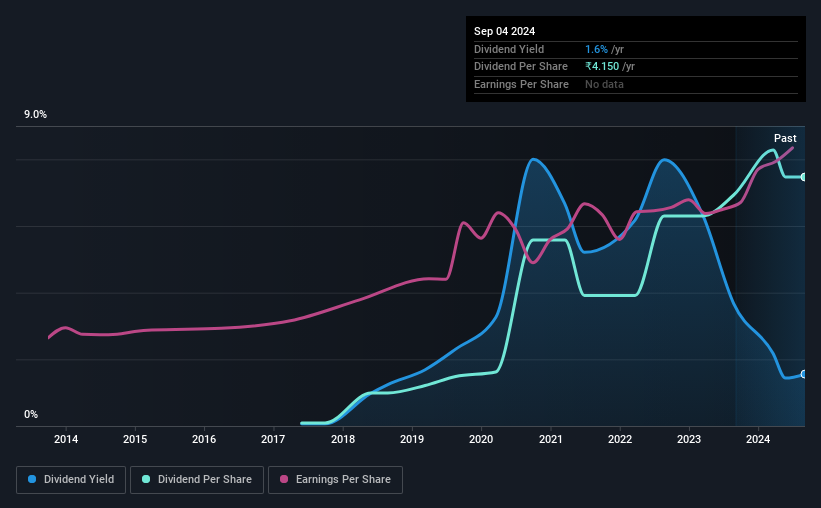- India
- /
- Diversified Financial
- /
- NSEI:HUDCO
Housing and Urban Development (NSE:HUDCO) Has Announced A Dividend Of ₹2.65

The board of Housing and Urban Development Corporation Limited (NSE:HUDCO) has announced that it will pay a dividend on the 25th of October, with investors receiving ₹2.65 per share. The dividend yield will be in the average range for the industry at 1.6%.
View our latest analysis for Housing and Urban Development
Housing and Urban Development's Dividend Is Well Covered By Earnings
Solid dividend yields are great, but they only really help us if the payment is sustainable. Based on the last payment, Housing and Urban Development was earning enough to cover the dividend, but free cash flows weren't positive. With the company not bringing in any cash, paying out to shareholders is bound to become difficult at some point.
Over the next year, EPS could expand by 13.6% if recent trends continue. Assuming the dividend continues along recent trends, we think the payout ratio could be 38% by next year, which is in a pretty sustainable range.

Housing and Urban Development's Dividend Has Lacked Consistency
Looking back, Housing and Urban Development's dividend hasn't been particularly consistent. This suggests that the dividend might not be the most reliable. Since 2017, the annual payment back then was ₹0.05, compared to the most recent full-year payment of ₹4.15. This implies that the company grew its distributions at a yearly rate of about 88% over that duration. It is great to see strong growth in the dividend payments, but cuts are concerning as it may indicate the payout policy is too ambitious.
The Dividend Looks Likely To Grow
With a relatively unstable dividend, it's even more important to evaluate if earnings per share is growing, which could point to a growing dividend in the future. We are encouraged to see that Housing and Urban Development has grown earnings per share at 14% per year over the past five years. Growth in EPS bodes well for the dividend, as does the low payout ratio that the company is currently reporting.
Our Thoughts On Housing and Urban Development's Dividend
In summary, dividends being cut isn't ideal, however it can bring the payment into a more sustainable range. While the low payout ratio is a redeeming feature, this is offset by the minimal cash to cover the payments. We don't think Housing and Urban Development is a great stock to add to your portfolio if income is your focus.
Investors generally tend to favour companies with a consistent, stable dividend policy as opposed to those operating an irregular one. Still, investors need to consider a host of other factors, apart from dividend payments, when analysing a company. Just as an example, we've come across 2 warning signs for Housing and Urban Development you should be aware of, and 1 of them is potentially serious. If you are a dividend investor, you might also want to look at our curated list of high yield dividend stocks.
Valuation is complex, but we're here to simplify it.
Discover if Housing and Urban Development might be undervalued or overvalued with our detailed analysis, featuring fair value estimates, potential risks, dividends, insider trades, and its financial condition.
Access Free AnalysisHave feedback on this article? Concerned about the content? Get in touch with us directly. Alternatively, email editorial-team (at) simplywallst.com.
This article by Simply Wall St is general in nature. We provide commentary based on historical data and analyst forecasts only using an unbiased methodology and our articles are not intended to be financial advice. It does not constitute a recommendation to buy or sell any stock, and does not take account of your objectives, or your financial situation. We aim to bring you long-term focused analysis driven by fundamental data. Note that our analysis may not factor in the latest price-sensitive company announcements or qualitative material. Simply Wall St has no position in any stocks mentioned.
About NSEI:HUDCO
Housing and Urban Development
Provides loans and financing for housing and urban development projects in India.
Proven track record and fair value.
Similar Companies
Market Insights
Community Narratives



